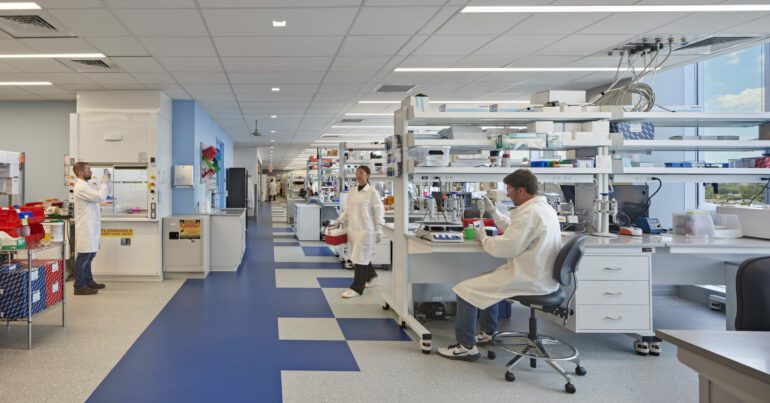TL;DR:
- Cellarity and the Chan Zuckerberg Initiative (CZI) are collaborating to advance machine learning algorithms for single-cell analysis.
- This partnership supports the Open Problems in Single-Cell Analysis initiative, focusing on benchmarking datasets and competitions.
- The 2022 competition drew over 1,600 participants, marking one of the largest single-cell competitions ever.
- The 2023 Kaggle competition aims to model cellular responses to chemical perturbations, enabling generalization to new perturbations and cell types.
- The goal is to bridge data science, machine learning, and computational biology for more efficient drug discovery.
- Entries for the 2023 competition are accepted until November 30, 2023.
Main AI News:
In a resolute move toward revolutionizing the landscape of medicine development, Cellarity, a pioneering life sciences enterprise incubated by Flagship Pioneering, has solidified a strategic partnership with the esteemed Chan Zuckerberg Initiative (CZI). This dynamic collaboration, initiated in 2021 with the staging of a multifaceted data integration competition, now expands its horizons to bolster innovation in the realm of machine learning (ML) algorithms for single-cell analysis.
The crux of this partnership is to lend substantial support to the “Open Problems in Single-Cell Analysis” initiative. It’s been an evolutionary journey that started with a data integration competition and has grown into a multi-pronged endeavor encompassing the development of unique benchmarking datasets, the orchestration of competitions engaging thousands of participants, and the nurturing of community-driven, open-source algorithm benchmarks, all hosted under the aegis of Open Problems.
Jonah Cool, Ph.D., Senior Program Officer of the Single-Cell Biology program at the Chan Zuckerberg Initiative, underscored the significance of this venture, stating, “Single-cell biology is at the forefront of biomedical research and data science. Now more than ever, we recognize the importance of benchmarks and challenges to help bring data science and cutting-edge computational approaches to single-cell biology. We are excited to again support Cellarity and Open Problems in Single-Cell Analysis as we unravel the mysteries of the cell, moving beyond descriptive biology and into mechanistic understandings.”
Fabrice Chouraqui, Pharm.D., CEO of Cellarity and CEO-Partner at Flagship Pioneering, echoed these sentiments with fervor, saying, “At Cellarity, we are constantly pushing the boundaries of machine learning applications for single-cell analysis. We are proud to partner with CZI and Open Problems in Single-Cell Analysis to unlock new applications that enable us to create medicines more efficiently and bring innovations to patients faster. We are excited to build on our track record of success hosting machine learning competitions in 2021 and 2022 to this year, challenge machine learning experts around the world to model simulated drug discovery experiments more efficiently.”
Diogo Camacho, Ph.D., Vice President of Computational Biology at Cellarity, highlighted the burgeoning complexity of single-cell data analysis, stating, “There are more than 1,500 algorithms developed for single-cell data, and understanding the deep complexity of cells captured by single-cell technologies requires robustly evaluating the performance of these methods. It’s exciting to see Cellarity scientists partner with academic leaders around the world to develop fair and open benchmarks.”
This collaborative journey commenced with the 2021 competition, focusing on multimodal data integration. Cellarity joined hands with the Chan Zuckerberg Biohub San Francisco, Yale University, and Helmholtz Münich to craft the most expansive benchmarking dataset for multimodal single-cell data. This dataset set the stage for three distinct tasks in multimodal single-cell data integration, complete with meticulously designed metrics for evaluation. The second competition in 2022 witnessed an even grander spectacle, powered by a new benchmarking dataset, revised task metrics, and an extension to temporal dynamics modeling. The 2022 edition garnered participation from over 1,600 competitors on Kaggle, solidifying its position as the largest single-cell competition to date.
As the journey continues into the current year, Kaggle enthusiasts will face a new challenge in the realm of single-cell data science. The competition will introduce a groundbreaking benchmark dataset aimed at addressing issues in modeling cellular responses to chemical perturbations. The ultimate objective is to foster the development of methods capable of generalizing to previously unseen perturbations and cell types, thus surmounting the practical and economic constraints associated with single-cell perturbation studies. This competition’s overarching goal is to leverage the strides made in representation learning, ushering in fresh possibilities that bridge the domains of data science, machine learning, and computational biology.
Contest entries will be accepted until November 30, 2023.
Conclusion:
The strategic partnership between Cellarity and the Chan Zuckerberg Initiative signifies a significant advancement in the field of single-cell analysis. By fostering innovation in machine learning algorithms and creating open benchmarks, this collaboration not only accelerates drug discovery but also opens up new opportunities for data science and computational biology. It underscores the increasing importance of data-driven approaches in the life sciences market, paving the way for more efficient and impactful medical breakthroughs.

